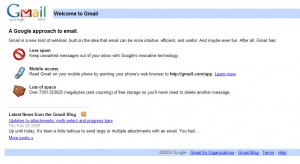by Tina Gasperson
Gmail is Google’s web mail service. It’s popular, easy to use, and free. One of the best features of Gmail is that it is easy to archive messages that you’ve already read, and search for them later using Google’s search technology. Google says you’ll never have to delete another message – they give you 7 GB of storage space for free. For that reason, some people have taken to using Gmail like a backup storage service by emailing files to themselves.
But what if the unexpected happens and Gmail loses your data? There are no guarantees, after all, that Gmail will not fail, and recent outages have spurred a greater awareness of that fact. Not only that, but Google holds no liability should it have a server outage that results in loss of data. And Google could, in theory, stop providing Gmail services altogether. Because Gmail is not invincible, it’s a good idea to back up your important messages and files in another location in addition to your Gmail account. You don’t have to back up all 7 GB of email, just the most important data – anything that you wouldn’t want to lose.
Backing up those important emails is easy – you can forward them to another one of your email accounts, such as a Yahoo address or the email account your Internet provider makes available, or forward them to both. You can also copy and paste the contents of emails into files and save them on your hard drive and back them up on a CD. If you have any documents or images that were sent as attachments, save them to your hard drive and put them on the CD too.
Tina Gasperson (tinahdee@gmail.com), affectionately known as Computer Lady by her family, has been writing about IT, home computing, and the Internet for more than a decade.
